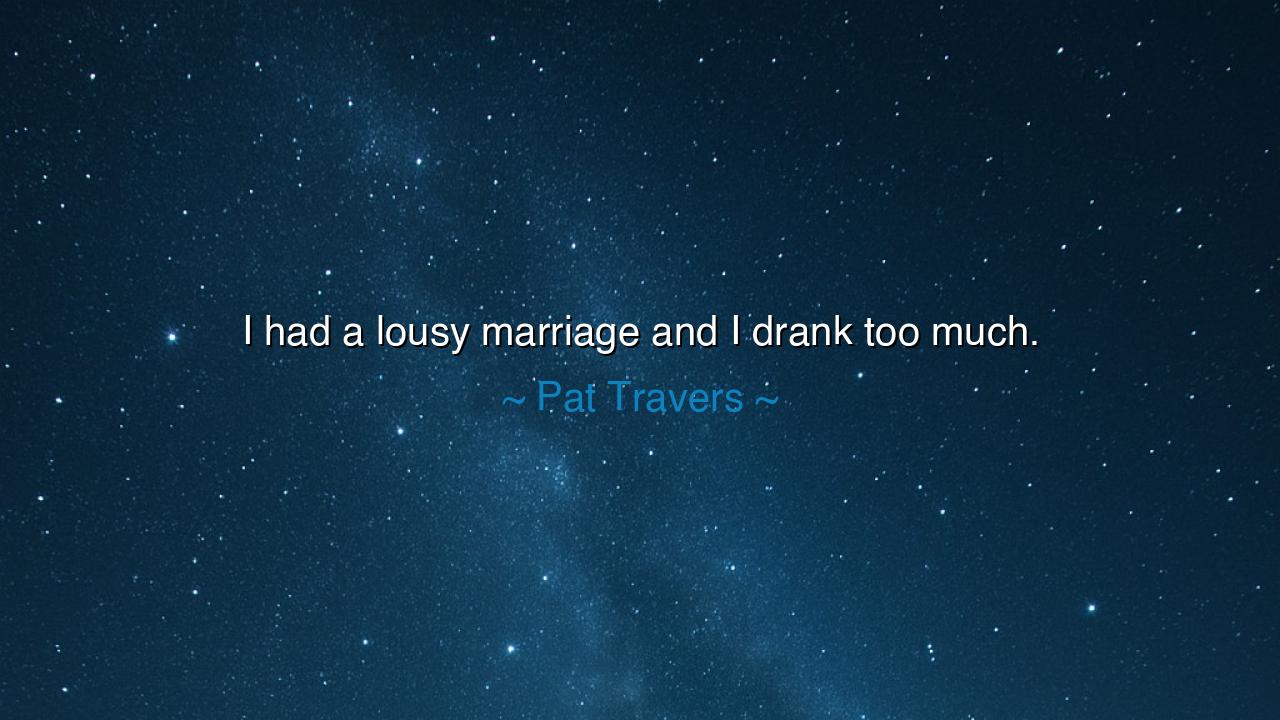
I had a lousy marriage and I drank too much.






Hear, O listener, the unvarnished confession of Pat Travers, who once said, “I had a lousy marriage and I drank too much.” These words, though plain upon the tongue, carry within them the weight of a human life tested by sorrow and excess. They are not a boast, nor an excuse, but a testament — the kind of truth that comes only after the storm has passed and a man stands alone among the ruins, seeing himself clearly for the first time. In this simple sentence dwells the eternal struggle between love and self-destruction, between the desire to be whole and the temptation to escape.
For every soul, at some hour, must face the twin shadows of failure and regret. To admit them aloud, as Travers did, is a sacred act — the confession that opens the gate to wisdom. The ancients knew this well: they said that a man cannot begin the journey of rebirth until he first kneels before the ashes of his own undoing. Marriage, when soured by neglect or pride, becomes a mirror that reflects not only the faults of the union, but the wounds of the spirit. And drink, when sought for solace, does not heal — it numbs. Yet within the numbness, truth waits, whispering: “Face yourself.”
In ancient times, there was a soldier named Diogenes of Sinope, not the philosopher, but a lesser-known warrior who returned from battle with both honor and emptiness. He had fought bravely but found no peace. He took a wife in haste, hoping love would quiet the noise of war within him. But his heart was restless, and his anger wild. He turned to wine, believing it a balm for his spirit. Years later, when all had fallen apart — his marriage, his dignity, his health — he wrote in a fragment found later by monks: “I fought the world and won, but I could not fight myself.” In his ruin, as in Travers’s confession, lies the same truth: the hardest war is the one within.
Travers’ words, though born of pain, are not merely lamentation — they are awakening. To say, “I drank too much,” is to name the enemy within the self. To say, “I had a lousy marriage,” is to admit that one has failed to love wisely or to be present fully. But these acknowledgments are not weakness; they are the beginning of strength. For the one who confesses his own folly is closer to wisdom than the one who hides behind false virtue. The ancients would say that the gods favor not the perfect, but the honest.
There is in this confession also a lesson about balance. In all things, life demands harmony — between pleasure and discipline, between companionship and solitude, between the outer world and the inner voice. When one leans too heavily toward indulgence or denial, the soul fractures. Travers’ tale reminds us that excess — whether in love, in ambition, or in drink — is the enemy of peace. For peace is not found in escape, but in acceptance: acceptance of one’s wounds, one’s limits, and one’s responsibility to heal.
Let none, therefore, judge too harshly those who fall. For every fall, when understood, becomes a form of rising. The one who has tasted bitterness knows better the sweetness of temperance. The one who has ruined love may learn to cherish it more deeply the next time. The ancients wrote that the finest steel is forged in fire; so too the strongest soul is tempered by remorse. Travers’ brief, humble admission stands as a kind of modern proverb — a warning and a hope entwined.
And so, dear listener, let the lesson be this: do not flee from your pain; face it. When love falters, do not drown it in forgetfulness; seek instead the wisdom it hides. When failure finds you, do not curse your fortune, but ask what the fall is teaching you. Turn your suffering into understanding, your regret into resolve. For the one who can say, as Pat Travers did, “I had a lousy marriage and I drank too much,” has already begun the walk from ruin toward redemption.
Let that journey be yours — honest, unflinching, and alive.






AAdministratorAdministrator
Welcome, honored guests. Please leave a comment, we will respond soon